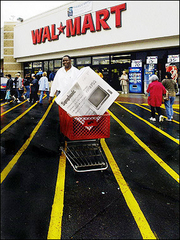Untitled Document
 |
Shoppers at Wal-Mart. A global
coalition of unions is launching an unprecedented campaign to organize
workers around the world at US retail giant Wal-Mart, seeking to bring
a new level of globalization to the labor movement.( |
A global coalition of unions is launching an unprecedented campaign to organize
workers around the world at US retail giant Wal-Mart, seeking to bring a new
level of globalization to the labor movement.
The Wal-Mart campaign was set to be officially launched at a meeting in Chicago
Monday of Union Network International (UNI), a group that includes 900 unions
in some 140 countries.
The campaign aims to draw from labor organizations around the world to pressure
Wal-Mart, the world's biggest retailer and largest private company in terms
of revenues, and a frequent target of unions for driving down wages as well
as prices.
Union leaders said they hope to bring collective bargaining or other improvements
to the estimated 1.6 million Wal-Mart employees around the world -- possibly
even in countries such as China, where western-style unions are non-existent.
"Our message is that unions are adapting to a borderless world,"
says UNI general secretary Philip Jennings.
UNI said it "wants to stop the Wal-Martization of the world by bringing
together unions in different countries to organize the retail giant's workers
and bring them the benefits of collective organization."
The global effort on Wal-Mart escalates a longstanding feud with the retailer
and the US-based United Food and Commercial Workers (UFCW), which has accused
the retailer of "union-busting" efforts to keep US stores from unionizing.
Wal-Mart maintains that it has no official ban on unions, but in a statement
on its website argues that in the United States, "we simply do not believe
that unionization is right for Wal-Mart."
Globally, Wal-Mart spokeswoman Beth Keck said, Wal-Mart "is seen as a
model and premier employer in many of the countries around the world."
She added: "Our policy is to operate within regulatory and customary business
practices everywhere we operate. Our employees can choose whether they want
to be union members or not, and overwhelmingly they have not."
The union gathering comes as UNI is currently presided by UFCW chief Joe Hansen,
who has led campaigns against Wal-Mart in the United States.
According to a statement from UFCW, Wal-Mart "pays poverty wages, ships
jobs to countries where sweatshops are prevalent and, in the US, shifts enormous
health care costs onto taxpayers."
Additionally, the union said that because of its size, Wal-Mart is able to
drive down wages and benefits, which "has become the new global economic
model" followed by many other firms.
"This meeting is about creating more effective global unionization,"
UFCW spokesman Jim Papian said earlier. "It's the only answer to meeting
the challenges of the global economy."
"We reject the Wal-Mart way and, at Chicago, UNI will be imagining a better
future for working people everywhere," added Jennings. "We will work
with the UFCW and those unions already established in Wal-Mart in Europe and
elsewhere to stop a damaging race to the bottom."
According to UNI, Wal-Mart employees have formed unions in Germany, Japan,
Brazil and other countries.
UNI and the UFCW said they have started a "dialogue" with unions
in China on organizing western multinationals there and have set up a liaison
office in India, even though there are currently no Wal-Mart stores in that
country.
Dan Cornfield, a Vanderbilt University professor of sociology, says the plan
is a bold effort to reinvigorate the labor movement, and is reminiscent of the
1930s, when unions took on the growing manufacturing sector in the United States.
"UNI taking on Wal-Mart is also the classic showdown between David and
Goliath," he said.
"Wal-Mart is a savvy and resourceful corporation, and its employees represent
the type of low-wage workers labor unions have gone after to increase their
dwindling membership. Post-World War II, recruiting low-wage workers in the
corporate service sector has been where the action is for labor unions."

